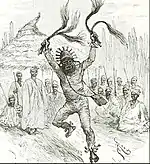Candomblé Jejé
Candomblé Jejé, also known as Brazilian Vodum, is one of the major branches (nations) of Candomblé. It developed in the Portuguese Empire among Fon and Ewe slaves. Jejé is a Yoruba word meaning stranger, which is what the Fon and Ewe slaves represented to the Yoruba slaves.
| Part of a series on Vodun related religions called |
| Voodoo |
|---|
 |
Vodums
Jejé spirits are called Voduns (sing. Vodum). According to tradition, they were introduced into the Kingdom of Dahomey from nearby lands by its founder King Adja-Tado, on the advice of a bokono (seer). Their cult was reorganized and uniformized by King Agajah in the 18th century.
Jejé Vodums are sometimes cultuated in houses of other nations by different names. For instance, the Vodum Dan or Bessen is called Oxumarê in Candomblé Ketu. Conversely, the Ketu Orixás may be cultuated in Jejé houses, but retain their names.
Voduns are organized into families:
| Dan | Yewá | Fá |
| Togun | Tohossou | Nohê Aikunguman |
| Tobossi | Sakpata | Wealth Voduns |
| Hevioso | Aveji-Dá | Nanã |
| Marine Naés | Freshwater Naés | Eku and Awun |
| Mawu-Lisa | Hohos | - |
Bibliography
- Parés, Luis Nicolau (2013). The Formation of Candomblé: Vodun History and Ritual in Brazil. Translated by Vernon, Richard. Chapel Hill: The University of North Carolina Press. ISBN 1469610922.
See also
- Candomblé
- Tambor de Mina (mixture of Dahomean religion, Yoruba Religion, Indigenous American, and European traditions, in Maranhão, Brazil)